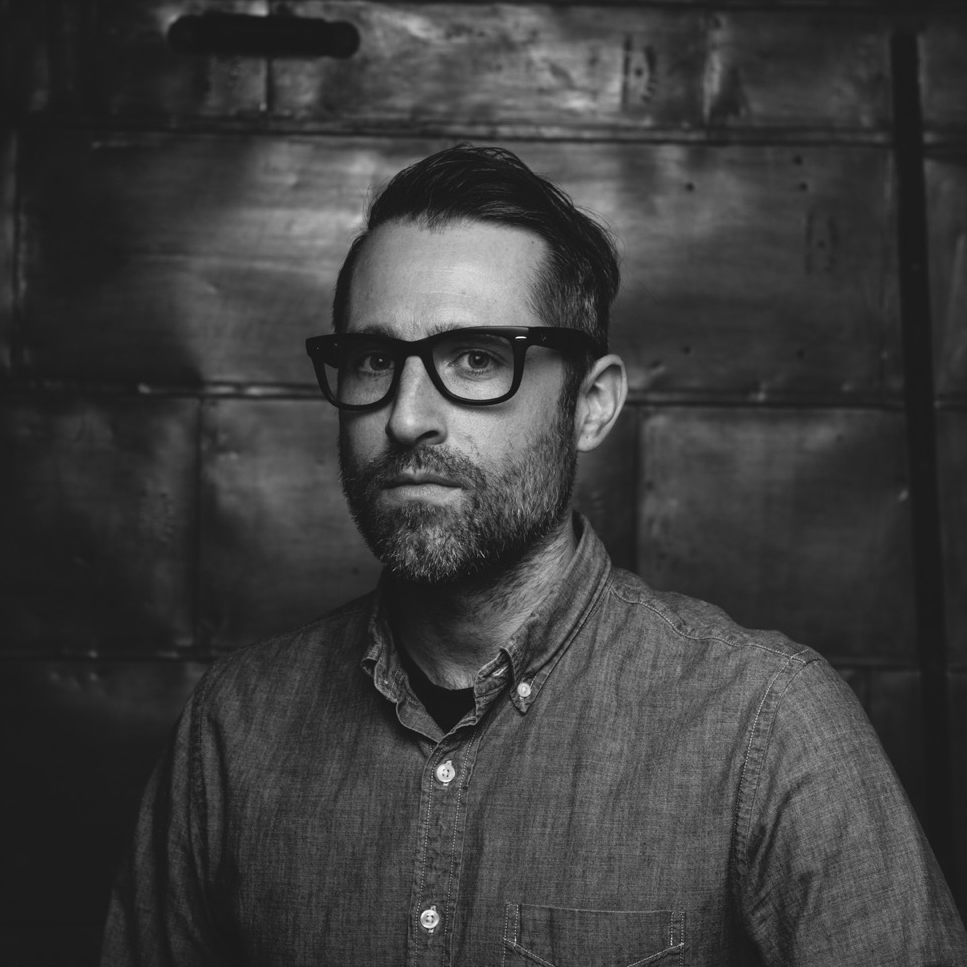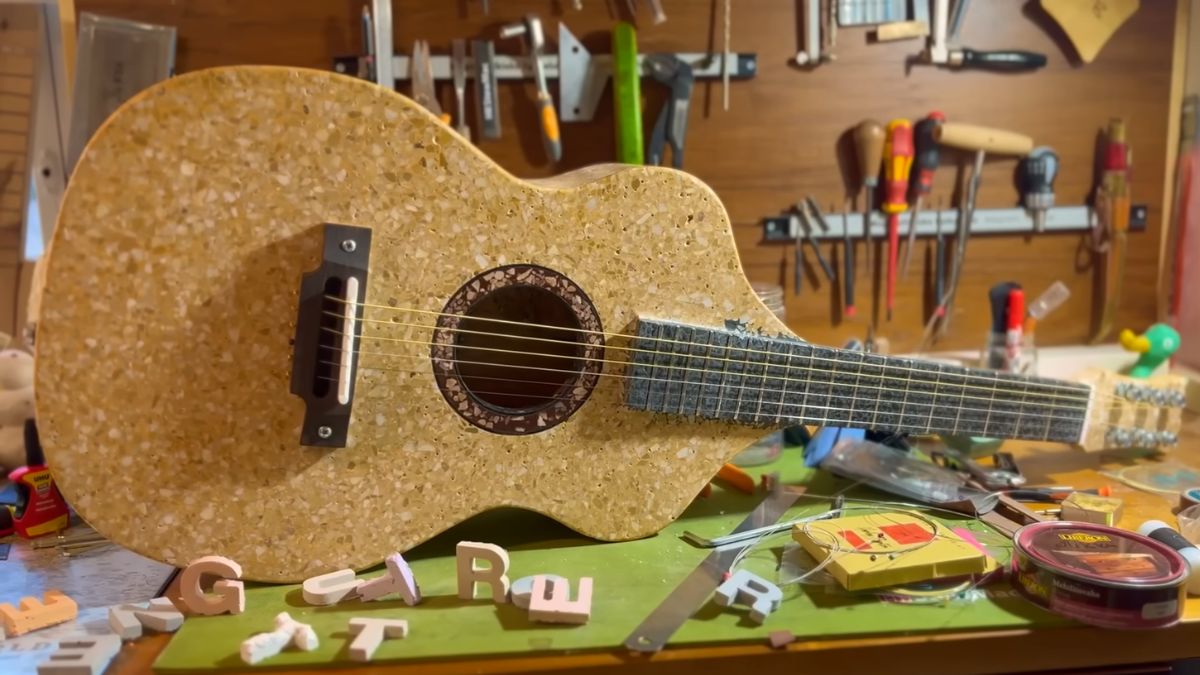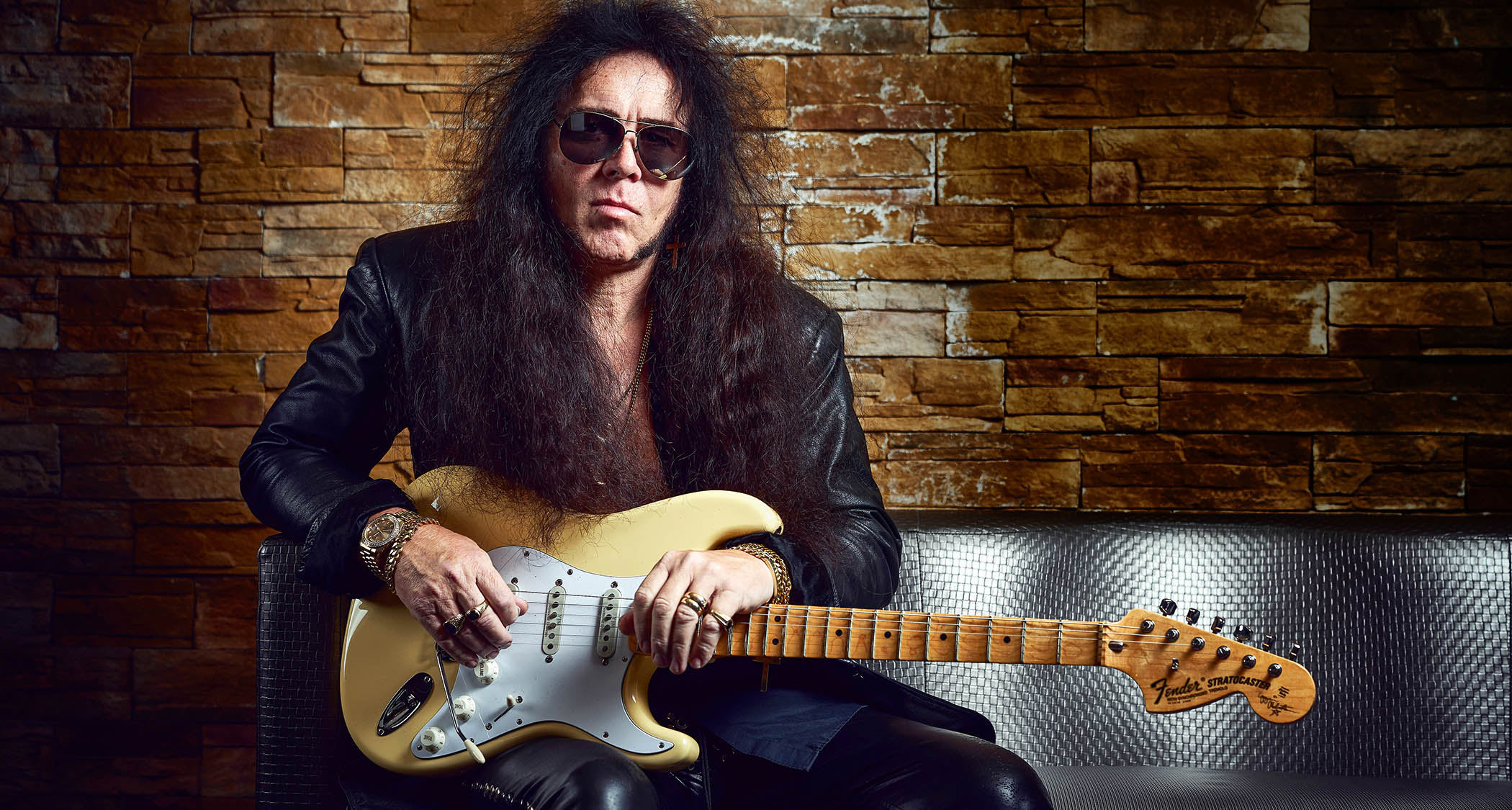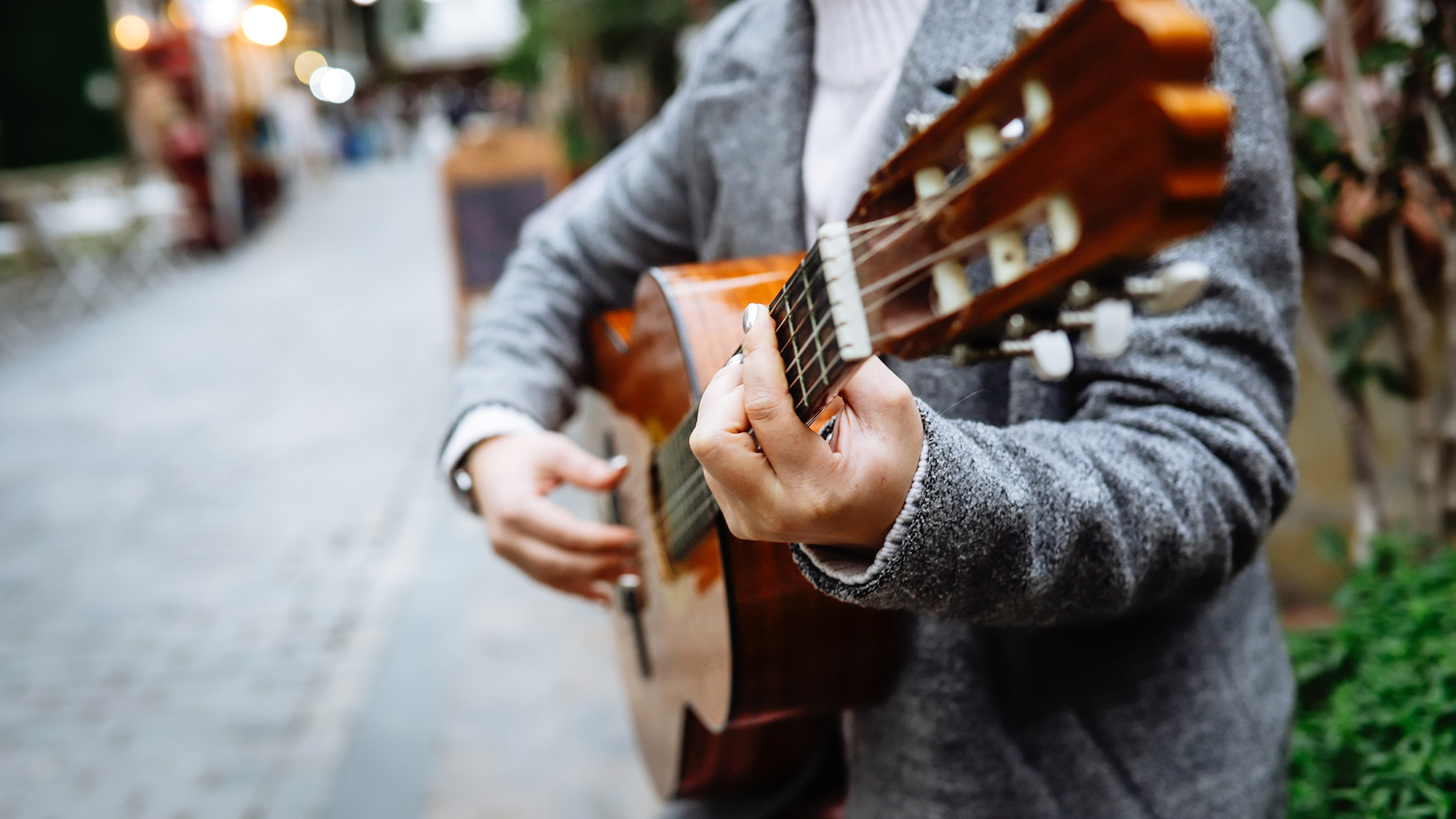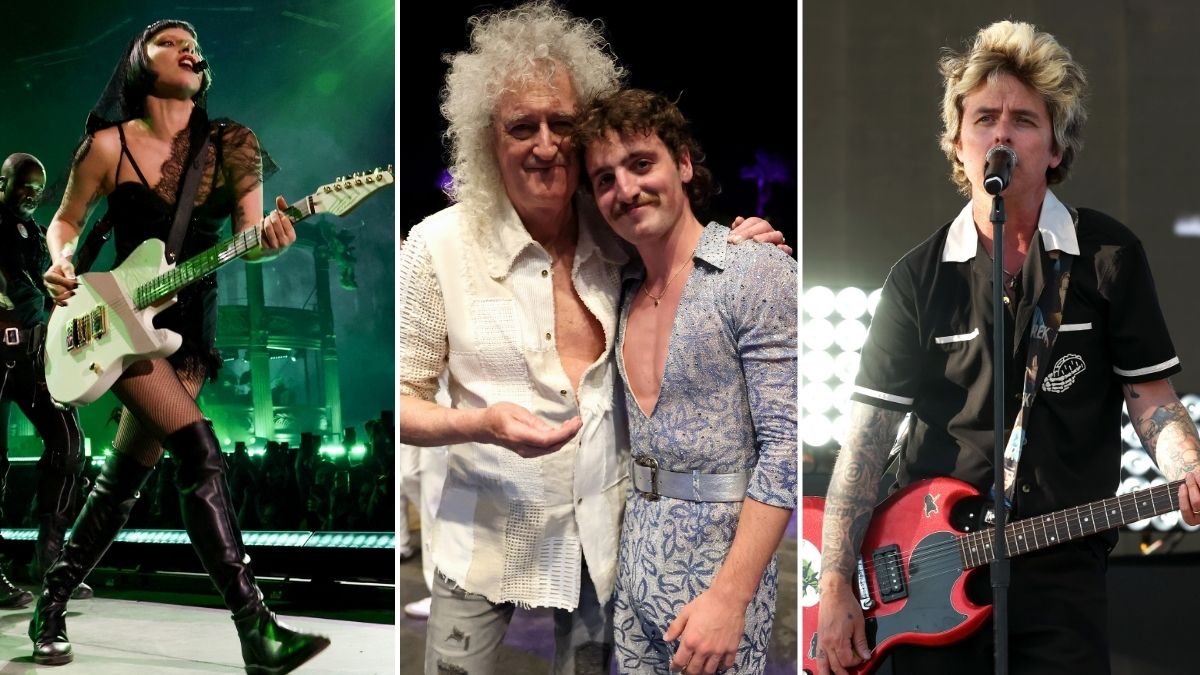Against Me!'s Laura Jane Grace Discusses Her Love of Rickenbackers, Her Musical Awakening
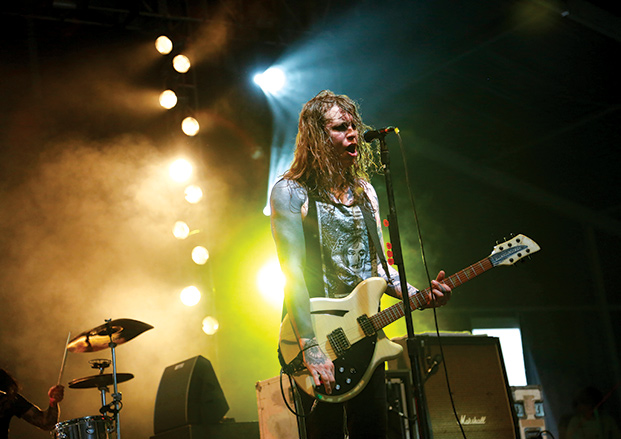
She’s a singer, songwriter, punk lifer, LGBTQ activist, book author and avid Rickenbacker collector, but what Guitar World readers really want to know is…
When I watched the “Thrash Unreal” video [from 2007’s New Wave], I got goosebumps when the water started pouring down on your Rickenbacker and James [Bowman’s] Les Paul. I felt like I was watching guitar abuse! Were the guitars ruined?
—Aimee Cole
[laughs] Actually that was kind of our grand scheme on how to scam the record label. But let me preface that by saying I hate that video. [laughs] I think it’s a terrible video. It was a compromised treatment. We wanted to do one thing and the label was like, 'no.' So we ended up going along with this plan that we didn’t want to do. But then when we were reading that they were going to be raining down fake wine on us and getting our instruments wet, I was like, “Well, let’s work money into the budget to get our guitars replaced.”
So we did the video shoot and immediately went outside and dried our guitars. [laughs] We took all the hardware off and set them in the sun and they were fine! The inside of the Rickenbacker that I played during the video is now dyed red, but other than that it’s totally fine. And I got a free guitar, another Rickenbacker, out of the shoot.
You’ve played Rickenbacker 360s in the past and seemed to have moved to Fender. Why the change? What is your number-one guitar right now?
—Greg ButcherInitially starting out I was always drawn more to Fender than Gibson. I feel like that’s the divide people have when they’re first starting out. I always liked the twangy, chime-y sounds of the Telecaster. I think my first proper electric guitar was a Squire Telecaster. I was always drawn to Rickenbackers because they had that same jangly sound and are also beautiful looking instruments. But they’re also really expensive instruments, so that’s a downside.
But I collect Rickenbackers; I have like 10 of them and I always have at least one out on the road with me. But I do love Fenders. With Shape Shift with Me I ended up using a Fender Coronado II pretty much for the whole thing. I was really impressed with that guitar. In addition to the Fenders and the Rickenbackers, I’ve been playing Nash stuff. Those three are my main go-tos, except for acoustic, and then I go Gibson.
I’ve noticed you use a lot of non-traditional chord shapes that allow a lot of open notes to ring out. Songs such as “I Still Love You Julie” and “Those Anarcho Punx Are Mysterious” come to mind specifically. Was this born out of necessity or a happy accident?
—Adam
Get The Pick Newsletter
All the latest guitar news, interviews, lessons, reviews, deals and more, direct to your inbox!
It wasn’t an accident by any means, but I think necessity is the wrong word. It was more kind of this naivety when you’re first starting to play guitar and write songs and realize, 'Dang it, every song I write feels like there’s only a certain amount of chords that I can draw from.'
So you start experimenting with different structures and chord shapes and thinking you’re reinventing the wheel, but really you’re just making an A chord in a different way. [laughs] But it adds different sounds to it, so figuring out different approaches is really valuable.Last year’s Shape Shift with Me was the first studio record that both Atom [Willard, drums] and Inge [Johansson, bass] appeared on. Did you take any new approaches in writing the music, collectively and/or on your own?
—Jace
Yes. It was way more of a collaborative effort. This record was pretty much written on tour. We’d go out on tour and come back and I’d have skeletons for two or three songs written. Then we’d work them out as a band, record them and then go back on tour. It was a way more fluid process and that’s what I wanted, because the record before that [2014’s Transgender Dysphoria Blues] was a really closed up experience and I felt like I had to have a stranglehold on it.
Why did you start playing guitar and who were your first inspirations?
—Dan MacInally
I started playing guitar when I was eight years old. I mowed lawns until I had enough money to buy a Harmony acoustic guitar out of a Sears catalog. My first musical awakening moment was seeing Madonna on TV, but beyond that I got really into the hair metal bands of the Eighties. I was obsessed with Guns N’ Roses and Skid Row and I wanted to be in a band. So I convinced my parents to get me guitar lessons and went from there.As a transgender female myself, and an alt-rock fangirl, I love your music and everything you’ve done. Thank you for being an inspiring figure. Is there any Against Me! song that you’d want to redo, or you feel carries a different message to what you want?
—Katy Lawson
I’d love to redo our whole first record [2002’s Against Me! Is Reinventing Axl Rose]. [laughs] Maybe the third, too [2005’s Searching for a Former Clarity]. From regretful choices in snare drum tones to the fact that we were just starting out. Our first record cost $800 to make and we recorded and mixed it in a day and a half. So you’re just going in there totally rushed and learning the ropes on how to make a record.
The older songs that we do still play have changed and evolved and I think that’s the value in doing live records, especially if, like with my band, there’s been lineup changes over the years. Being able to give a presentation of older songs that’s more representative of the band you are today is great.
My ex, who is a trans girl, is the lead guitarist and composer in a metal band. She’s come out to her bandmate, however, she’s afraid to be out in public because she thinks it’ll ruin her band’s chance of making it. Do you think the punk/metal community has become more accepting of trans-fronted acts?
—Wren
I think there’s definite progress being made for sure. Someone that really inspired me with coming out is Mina Caputo who sings in Life of Agony. In rock and roll’s history there’s always been people blurring gender lines. That’s what attracted me to the bands I liked as a kid like Guns N’ Roses and Skid Row. Oftentimes I’d look at them and think, I can’t tell if this is a boy or girl. I think through visibility you make progress.As a grrrl guitarist, I struggle with a lot of dudes hounding me about my rig and my playing style, and they don’t even bother bringing it up around their fellow male counterparts! What is your personal way of dealing with weird elitist gear bros?
—VI Mayugba
[laughs] I guess I’m lucky that I’m kind of insulated, and that we have a great guitar tech that tours with us. So I’m kind of cut off from dealing with other people in that capacity. But I’m also more of the style of player where it’s like, Does it work? Awesome. Does it not work? Why the fuck not. [laughs] Those are about my only questions. When people start asking me technical stuff I just kinda blank. [laughs]
Your singing style is powerful, gritty, aggressive and distinctive but very comprehensible and passionate. How did you develop your singing voice? Who were your main singing influences?
—Erik Chevrier-Langevin
When I was younger my two vocal heroes were Jim Morrison and Axl Rose. There’s a certain quality that Axl Rose has that’s like this real guttural raaaaahhhh thing. It’s a trebly vocal thing that I’m always attracted to. Same thing with Kathleen Hanna from Bikini Kill and Jesse Michaels from Operation Ivy. It’s so biting and good.
What are some essentials you never tour without? Also what kind of eyeliner/eye shadow do you use. It looks awesome!
—Alex
[laughs] Smashbox eyeliner right now. [laughs] For tour essentials, it goes without saying in this day and age everyone has their cell phone and computer. But I always make sure I have a good book, my journal and my acoustic guitar. You’re good to go from there. I try to be a minimalist. The more you bring the more you’re responsible for carrying around and making sure it’s organized on the tour bus…and that’s like living on a submarine with limited space.I found your heartbreakingly riotous acoustic record [Against Me! 2001 EP] a dozen years back. Only later did I become acquainted with your equally phenomenal full-fledged sound. Any plans to return to the more stripped-down sound?
—Amanda Y.
I’d love to. I love doing a full band tour but then breaking away and doing a solo acoustic show. I’m a real strong believer in the idea that if the song is really good then it has to be able to hold its own with just a voice and an acoustic guitar. So I always approach the start of the song in that way to see if it works on an acoustic guitar.
As long as you have that base and know that it’s solid you’re usually pretty good to go. But yeah I’m sure I’ll eventually get around to doing another record that’s just stripped down like that.
What are some key factors for success for up and coming bands?
—Spencer Shelton
Be willing to play for anyone, anywhere, anytime. And no joke, practice all the time. Learn every single aspect of what you do. Be open to criticism and take advice from other people. Pay attention to how other people do it. Take notes; see what works for you and see what doesn’t. Those old clichés—like, How do you get to Carnegie Hall? Practice, practice, practice—are true. And don’t sell your publishing rights!
Brad is a Brooklyn-based writer, editor and video producer. He is the former content director of Revolver magazine and executive editor of Guitar World. His work has appeared in Vice, Guitar Aficionado, Inked and more. He’s also a die-hard Les Paul player who wishes he never sold his 1987 Marshall Silver Jubilee half stack.
“There’d been three-minute solos, which were just ridiculous – and knackering to play live!” Stoner-doom merchants Sergeant Thunderhoof may have toned down the self-indulgence, but their 10-minute epics still get medieval on your eardrums
“There’s a slight latency in there. You can’t be super-accurate”: Yngwie Malmsteen names the guitar picks that don’t work for shred
